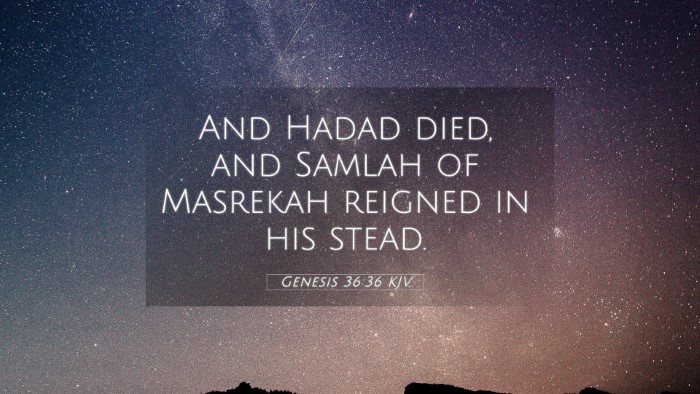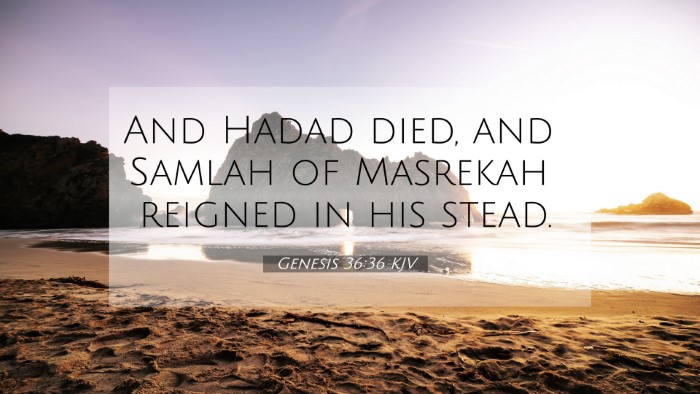Understanding Genesis 36:36
Genesis 36:36 refers to the period of rule of a king named Hadad, who was one of the last kings of Edom. The verse states: “And Hadad the son of Bedad, which smote Midian in the field of Moab, reigned in the land of Edom.” This verse is significant as it illustrates the leadership transitions within Edom, a nation deeply connected with the history of Israel.
Context and Historical Significance
The genealogical records and the succession of kings in Edom, specifically noted here, serve a dual purpose: they document the historical reality of the time and connect the narrative of the Edomites to broader biblical themes.
- Historical Background: The mention of Hadad links to other biblical accounts where kings rise and fall, emphasizing the transient nature of earthly powers.
- Conflict with Israel: The Edomites were often in conflict with the Israelites, making this mention relevant in understanding the dynamics between these neighboring nations.
Commentary Insights
Public domain commentaries provide further depth to the understanding of this verse:
- Matthew Henry: Henry emphasizes the significance of Hadad's victory over Midian, suggesting that it elevates Hadad’s status as king, showcasing divine providence in choosing leaders who shape history.
- Albert Barnes: Barnes notes that Edom, ruled by Hadad, continues its legacy in biblical prophecy, particularly relating to Israel's future interactions with it.
- Adam Clarke: Clarke discusses the geographical implications of this verse and how it mirrors the migrations of the Israelites, inviting comparative analysis of the biblical narrative surrounding these two nations.
Bible Verse Cross-References
Genesis 36:36 presents an intersection of narratives and themes that can be explored through several cross-references:
- Numbers 20:14-21: This passage highlights the relationship between Israel and Edom, offering insight into their historical tensions.
- Deuteronomy 2:2-6: This reinforces Israel's approach to Edom, which is crucial for understanding Genesis 36:36's implications.
- 1 Chronicles 1:43-50: This genealogical account parallels the kings mentioned in Genesis, providing additional context for Hadad's reign.
- Malachi 1:2-3: Here, the Lord declares His love for Jacob and hatred for Esau's descendants—Edom, further underlining the theological undertones of Genesis 36:36.
- Isaiah 34:5-6: This prophecy against Edom serves as a reminder of its ultimate fate, which is pivotal in biblical eschatology.
- Psalm 137:7: This verse recalls the historical despairs of Israel, which included Edom's role in their suffering.
- Matthew 2:16: The massacre of the innocents connects back to Old Testament narratives, reflecting on the historical animosities and their implications.
- Hebrews 12:16: This discusses Esau, linking to the foundations of the Edomite lineage and its descendants.
Thematic Bible Verse Connections
Genesis 36:36 can serve as a thematic springboard when exploring broader biblical themes:
- Divine Sovereignty: The establishment of rulers is portrayed as under divine guidance, evident in the lineage presented in this verse.
- Conflict and Resolution: The history of Edom highlights the conflict between related nations, mirroring the struggle within humanity.
- Prophetic Insights: Edom's downfall becomes a propulsive theme as the narratives unfold toward eschatological events.
Tools for Bible Cross-Referencing
For those interested in deeper study of Genesis 36:36 and its connections throughout scripture, various tools can facilitate effective cross-referencing:
- Bible Concordance: Useful for locating and cross-referencing key terms and names.
- Cross-Reference Bible Study: Engaging in studies that pinpoint connections between verses offers greater depth and understanding.
- Bible Reference Resources: Utilize materials that consolidate biblical themes and connections, strengthening comprehension of scripture.
Conclusion
Genesis 36:36 encapsulates a moment in history that reflects God's overarching narrative of sovereignty and purpose. By linking this verse with other scriptures and utilizing effective study tools, one can uncover profound insights into the shared story of humanity within the biblical text.
Further Study Suggestions
As you explore Genesis 36:36 and its implications, consider the following:
- How do the themes of leadership and conflict manifest in both the Old and New Testaments?
- In what ways do the genealogical records contribute to our understanding of God’s plan?
- What are the parallels between the Edomite kings and the rulers of Israel?


